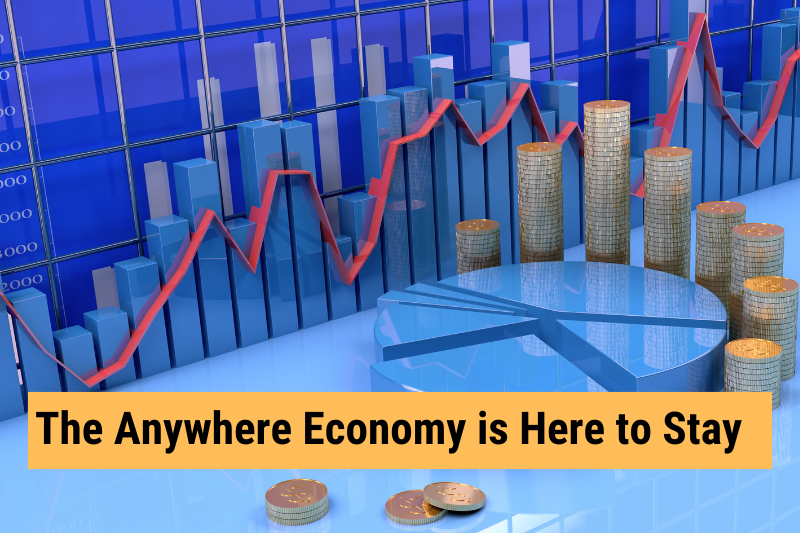The past 50 years have spawned the information economy. The term, coined by a graduate student at Stanford University, refers to an economy that emphasises informational activities and values information as a capital good. You can’t be a white collar professional in the 21st century and escape this term and all its implications.
But since 2020, the narrative has changed slightly from information economy to anywhere economy. Unsurprisingly, the reason for this shift is the COVID-19 pandemic. Following this global healthcare crisis, lockdowns and social distancing norms became commonplace all over the world. Supply chains were disrupted and companies struggled to maintain business continuity and deliver their goods and services to customers. As markets were shaken up, new business models evolved and people’s expectations changed. In this unprecedented scenario, the anywhere economy emerged and quickly surged, driven by increasing demands for “anything, anytime, anywhere”.
From the Information Economy to the Anywhere Economy
The Internet already played a starring role in the pre-COVID information economy. From cloud technology, social media, and content streaming platforms, to communication tools and e-commerce platforms – the information economy was already thriving before 2020.
And yet, anywhere/anytime experiences were still the exception rather than the norm. As soon as COVID hit, these experiences suddenly became the norm. More people started working remotely. Many more shopped online and took advantage of no-touch packaging, kerb-side delivery, and other unique offerings. Other members of the global population bought houses and cars, signed up for online learning courses, started enjoying streaming entertainment – remotely and without having to step out of their homes.
The new anywhere economy started as a constraint in the early days of the pandemic. But as lockdowns continued and other challenges came to the fore, the economy ended up as a source of liberation. Millions of workers achieved liberation from long workday commutes, shopping trips, doctor visits, and meetings with when clients, bosses, colleagues, and so on. In this way, the dark cloud of the pandemic showed us a welcome silver lining.
Without a doubt, the pandemic and the following two years have strained the patience and fortitude of people all over the world. The crisis brought human tragedy and disrupted lives. But at the same time, it also showed that the human race is capable of adjusting and even thriving in the midst of a crisis. It also proved that there are other ways to live and work. Some of these ways are better than what we were used to in the information economy and have the potential to improve the human experience and make us happier and more content than ever before.
The Anywhere Economy of the Future
The anywhere economy is not going anywhere. If anything, the economy will only become further entrenched over the coming years. People’s desire for anywhere experiences will grow and they will want to keep doing what the pandemic allowed them do – work, play, and meet remotely, safely, and conveniently.
In this scenario, businesses will have to revisit their capabilities and ask themselves if they are helping or hindering people from doing anything from anywhere. Only those companies that can innovate and adjust to these new realities will succeed. Others will become obsolete.
Successful companies will bring anywhere alternatives across a wide range of activities. Some anywhere experiences will augment the in-person economy. One example is digital communication tools that allow students to study remotely and people to attend weddings virtually. Other anywhere experiences will partially replace their in-person equivalents. Hybrid work models are a good example.
Finally, some anywhere experiences will completely replace the need for in-person experiences. Many technologies and tools for work fall into this category. One is digital signature solutions. Another is LegalTech software that enables legal practitioners to do away with old-fashioned legal workflows and replace them with digitisation and virtualisation.
Wrap-up
At the end of the day, it doesn’t really matter whether a product or service augments, partially replaces, or fully replaces in-person experiences. What matters is that all these new developments and innovations are creating new opportunities, improving human experiences, and contributing to economic growth.
The anywhere economy is here to stay. It may have emerged as a side effect of a large-scale human crisis. But over the past few years, it has evolved into a transformational concept that brings greater opportunities for personal, professional, and business growth to the human race. In the years ahead, the anywhere economy will shine even brighter. It will redefine the relationships between people, places, and businesses, and bring new, welcome ways of living and working for people all over the world.












0 Comments